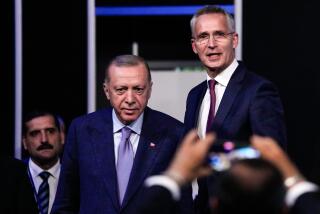Bosnia Seeks to Join NATO-Allied Group
WASHINGTON — President Alija Izetbegovic of Bosnia-Herzegovina appealed to President Clinton on Wednesday to let his beleaguered Balkan country join the NATO-affiliated Partnership for Peace, a step that he considers necessary before U.S. and allied peacekeeping troops withdraw next year as planned.
But Clinton, administration officials said, left little doubt that the force will depart on schedule in June 1998, whether Izetbegovic’s government is ready or not.
During a 45-minute meeting in the White House, Izetbegovic said that if Bosnia is admitted to the 27-nation partnership--established as a sort of waiting room for countries seeking full membership in the North Atlantic Treaty Organization--it will pave the way for lasting peace in a region torn by bitter ethnic conflict.
Appearing with Clinton, Izetbegovic also ticked off other conditions--some seemingly unattainable--that he said must be met before the Bosnian authorities can maintain order after the pullout of peacekeeping troops, including 8,000 Americans. In addition to Bosnian membership in the partnership, those conditions included full implementation of the stalled civilian requirements of the 1995 Dayton, Ohio, peace accord and steps to eliminate Bosnian Serb military superiority.
The partnership, made up of former members of the Soviet-led Warsaw Pact and countries that were neutral during the Cold War, conducts joint military exercises with NATO and engages in other forms of military and political cooperation with the alliance.
“The president did say that the United States would support Bosnian participation in the Partnership for Peace but that it had to be on the basis of the [Muslim-Croat] federation working together and on greater cooperation between the federation and the Bosnian Serbs,” said David Johnson, Clinton’s foreign policy spokesman. He noted that none of those conditions has been met.
Izetbegovic, a Muslim, is president of the Bosnian republic which, under the Dayton accord, is supposed to control foreign policy, international trade and other similar functions for the entire country. But most of the actual power--including military and police functions--is divided between the Bosnian Serb entity and the Muslim-Croat Federation.
Izetbegovic and Clinton agreed that implementation of civilian aspects of the Dayton accord is lagging. Both pledged to work harder to comply with the pact but gave little indication of how.
On other issues that have created friction between the United States and Bosnia, Clinton warned Izetbegovic against renewing Bosnia’s military and intelligence cooperation with Iran. Izetbegovic in turn called on Washington to take additional steps to apprehend accused war criminals.
“We received clear assurances that the war criminals will be brought to justice,” Izetbegovic said.
However, Johnson said that the U.S. has not changed its view that the NATO-led peacekeepers must not be converted into a police force.
More to Read
Sign up for Essential California
The most important California stories and recommendations in your inbox every morning.
You may occasionally receive promotional content from the Los Angeles Times.










